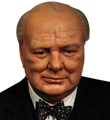Churchill Books
|
| updated |
Copy Link Code
|
 When it comes to writing books, Winston Churchill has few competitors. As one of the most prolific leaders of all time, he wrote 43 books, published in 72 volumes, throughout his entire life and even after his death. He also authored countless speeches, political writings, and correspondence.
When it comes to writing books, Winston Churchill has few competitors. As one of the most prolific leaders of all time, he wrote 43 books, published in 72 volumes, throughout his entire life and even after his death. He also authored countless speeches, political writings, and correspondence.
His first book was The Story of the Malakand Field Force published in 1898, describing the uprising in the Northwest Frontier in India. His work The River War (1899) was nearly 1,000 pages long, depicting his experiences as an officer in the British Army, at the time of the Mahdist War in Sudan. The novel Savrola (1899) revealed Churchill's true political philosophy, which he would carry with him throughout his career. The work entitled London to Ladysmith via Pretoria was an account of his capture and escape from the Boers, following an attack on the Armoured Train. In 1906, he published Lord Randolph Churchill, a biographical account of his father. He also published numerous collections of his speeches, from different periods of his military and political careers, such as For Free Trade (1906), Liberalism and the Social Problem (1909) and The People's Rights (1910).
One of Churchill's most famous written works is The World Crisis, a five-volume, 2,500-page description of his time during the years of 1911-28. The writing is superb, pulling the reader into a time when the world was reeling from the triumph and tragedies of unimaginable world conflict, up to and including World War I. He not only details behind-the-scenes political and military maneuvering, he also regales the reader with tales of modern warfare including airplanes flying overhead, thunderous artillery, combat in the trenches, and even chemical warfare.
Another well-known book written by Winston Churchill, Victory (1946) is a collection of his final speeches of World War II. Commonly, it is found as part of a three-volume set called War Speeches 1940-1945 (1946).
In his work The Gathering Storm, Winston Churchill continued where he left off in The World Crisis. This book is actually the first volume of a six-volume set, titled The Second World War (1948-53). Together, the volumes comprise more than 5,000 pages including maps and plans. The quality of this comprehensive and revealing work was so phenomenal, it led to his being awarded the Nobel Prize for Literature in 1953. To write this epic collection, he worked with a small team of writing assistants, referring to his notes from the time period and privileged official documents he had access to while still serving as a politician. Although he wrote from his personal perspective, he was actually somewhat subjective in his treatment of the topic, while excluding top secret information about things such as intelligence tactics.
